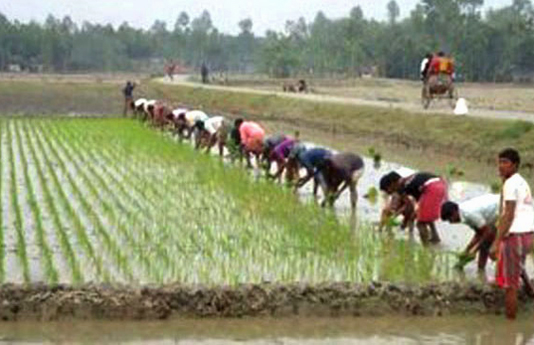RAJSHAHI, Jan 31, 2021 (BSS)- Braving the dense fog and biting cold, farmers are passing their busy times in transplanting Boro seedling with the hope of getting cherished yield everywhere in the region including its vast Barind tract.
Agricultural officials and farmers are very much hopeful about exceeding the farming target of boro paddy this season because of farmers’ delight with the selling price of transplanted aman paddy at present.
Nurul Amin Siddiqui, President of Kornohar Borobilla Water Management Association in Paba Upazila, said the farmers of his area are passing busiest days with transplanting of boro seedlings and land preparation works. Personally, he will cultivate boro paddy on five bighas of land this year.
He added that the price of both aman paddy and rice has increased for the last couple of weeks as a result of government-level aman rice procurement drive inspiring the farmers to transplant paddy seedlings.
Besides, seedling transplantation activity has generated employment for many marginalized people.
Meanwhile, around 35.24 lakh tonnes of irri-boro rice are expected to be produced from 8.10 lakh hectares of land in all eight districts of the Rajshahi division during the current season, officials said.
The target has been set to produce 31.86 lakh tonnes of high yielding varieties of rice from 7.44 lakh hectares of land, 3.27 lakh tonnes of hybrid varieties from 61,680 hectares and 7,930 tonnes of local varieties from 3,965 hectares of land.
Department of Agricultural Extension (DAE) has set the target of producing 15.34 lakh tonnes of rice from 3.53 lakh hectares of land in four districts of Rajshahi Agricultural Zone, while 19.88 lakh tonnes from 4.57 lakh hectares of land in four other districts of Bogura Agricultural Zone.
Seedbeds on around 39,960 hectares of land including high yielding varieties on 37,239 hectares were developed to meet the seedling demand in the division.
Sirajul Islam, Additional Director of DAE, said all the district, upazila and field level officials and others concerned are giving suggestions to the farmers to protect their seedbeds from cold injuries after covering their seedbeds with polythene at night.
Some 24,600 small and marginal farmers were given support with seed and fertilizers in the division under the government’s agriculture incentive programme to boost the boro rice production.
Abu Rahman, a farmer of Gubirpara village under Tanore Upazila, has been preparing for boro cultivation on 20 bigha of land for the last couple of weeks. With removing stagnant water, he has started seedling transplantation on nine bigha of land in Bilkumary Beel.
“I have got a better price of the latest Aman paddy. So, I have started boro transplantation early,” said Rahman, adding the day labourers are charging higher wages due to the present cold weather.
Abul Kashem, a farmer of Mayamari village under Niamatpur Upazila, said he has prepared seedbeds on 25 decimals of land for cultivating paddy on 18-bigha of land this season. He has started transplantation of seedlings.
Upazila Agriculture Officer Shamimul Islam said they have taken all possible preparations to make the boro farming a total success.
There are 536 deep tube-wells and 41,174 shallow tube-wells with other low lift pumps to provide necessary irrigation to the farming fields in Tanore upazila, he added.
Bangladesh Rice Research Institute (BRRI) has taken diversified steps including farmers training, projection plot and supplying of the newly developed high yielding varieties among the growers to make the irri-boro farming a total success.
BRRI has released 14 Boro varieties of paddy which are appropriate for Rajshahi region including its Barind area, said Dr Fazlul Islam, Principal Scientific Officer of BRRI, adding, of those, Brridhan50 is export-oriented premium quality rice, Brridhan58 is comparatively high yielding and Brridhan84 is iron and zinc-enriched.
The conventional varieties are being replaced by modern varieties which are good signs for the region in terms of boosting yield, he said.
He said there is no way but to boost the rice yield to ensure food security amidst the existing challenges of adverse impact of climate change and COVID-19.



